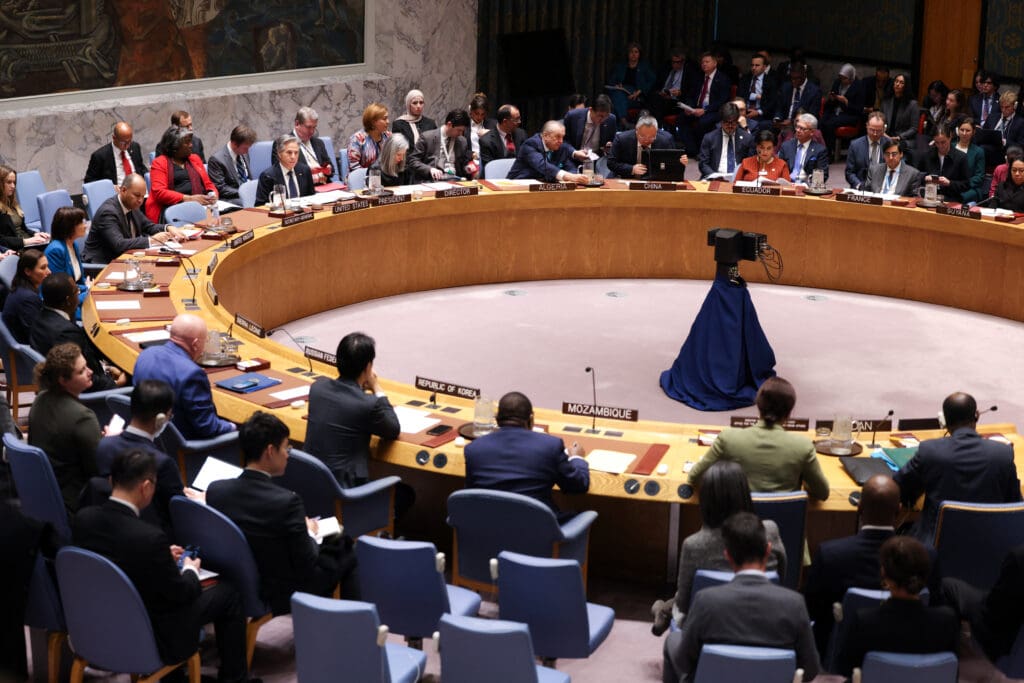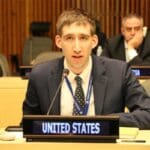On September 12, the UN Security Council unanimously renewed its arms embargo on Sudan’s western region of Darfur. The decision extends for a year the territorial embargo against the supply of weapons, ammunition, military equipment and related material. It also renews targeted sanctions against individuals, namely travel bans and asset freezes, with the aim of stemming the flow of weapons to belligerents that have committed atrocities in the region.
The renewal comes amid immense human suffering as Sudan’s catastrophic civil war, now in its third year, grinds on. The Security Council has called on the belligerents to resume talks toward a lasting ceasefire, but this has not materialized. Yet the Council’s unanimous renewal of the Darfur arms embargo reflects at least a consensus among its members that ending the flow of arms and external support to the conflict parties is key to ending the conflict.
What is now critical is implementation—particularly, ensuring that the Panel of Experts established under the original UNSC Resolution 1591 (of 2005) and reappointed annually is reconstituted and empowered to report robustly on violations of the embargo. The Panel’s reporting is key to translating the Council’s renewal of the arms embargo into actions that actually reduce atrocities and promote accountability for violators.
The delay in agreeing to constitute the Panel of Experts has not been publicly explained, although there are reports that some Council members had objected to the filling of certain positions. What is clear is the resulting damage: the lack of such a panel results in a lack of objective information regarding violations.
The Independent Fact-Finding Mission for Sudan, authorized by the UN Human Rights Council, released a report early this month documenting extensive war crimes by both the Sudanese Armed Forces (SAF) and the rival Rapid Support Forces (RSF) paramilitary group, as well as crimes against humanity by RSF which is laying siege to the city of El-Fasher in Darfur.
The Fact-Finding Mission urged the belligerents to end ethnic and sexual violence, ensure humanitarian access, halt attacks on civilian camps and ensure accountability. But the mission’s findings do not carry the same political weight as the UNSC’s Panel of Experts.
In the absence of such accountability, Sudan’s civilians continue to pay an immense price. In August, youth-led nonprofit Darfur Advocacy Group’s Ikhlass Ahmed told the Security Council that “12 million people, primarily women and girls, are at risk of gender-based violence in Sudan.”
The Security Council’s negotiations over the sanctions were reportedly marked by disagreements over whether the urgency of the situation on the ground justified new proposals such as expanding the sanctions regime’s territorial scope to other regions of Sudan beyond Darfur, where there is also fighting and insecurity.
Russia remarked at the Council that it voted in favor of the renewal, but “categorically rejected” proposals for extending sanctions to other regions of Sudan, arguing instead for “constructive cooperation” with the Government of Sudan.
Ending External Interference
The contrasting positions between Council members mean that the recent resolution on Sudan sanctions was primarily a technical renewal of existing measures. Still, despite not agreeing to updated measures in response to the conflict, the Council’s unanimous renewal demonstrates that there remains a level of common ground among its members in New York.
The Council’s press statements, most recently on August 13, include the recognition that the conflict in Sudan needs to end through dialogue and a transition towards a democratically-elected government. The Council has repeatedly rejected external interference in Sudan.
This aligns with broader calls beyond the Security Council. On the same day as the sanctions renewal, Egypt, Saudi Arabia, the UAE and the U.S. issued a joint statement calling for a humanitarian truce and acknowledging that “an end to external military support is essential to ending the conflict.” Similarly, the African Union’s Peace and Security Council has demanded an end to external military and financial support to the warring parties.
A joint statement by the “African three plus” members of the Security Council—Algeria, Guyana, Sierra Leone and Somalia—also emphasized that the conflict is “fueled mainly by the military support provided by external actors” and called for accountability for those massacring civilians on ethnic lines and committing conflict-related sexual violence, all facilitated by violations of the arms embargo.
Attention should now turn to strengthening implementation. In addition to the arms embargo for Darfur, the sanctions regime under Resolution 1591 includes a travel ban and assets freeze against individuals who “constitute a threat to stability in Darfur and the region.” In November 2024, the Council used those tools with updated designations against two RSF commanders: Abdel Rahman Juma Barkalla and Osman Mohamed Hamid Mohamed.
The United Kingdom called for expanded use of these sanctions, such as against perpetrators of conflict-related sexual violence. Following through with designations of additional individuals would be an important step toward advancing accountability.
Yet to do so, it is critical to ensure that a Panel of Experts on Sudan can produce authoritative reporting on violations of the embargo, to inform the Council’s next steps. The delay in constituting the panel has a significant impact, causing a lack of information and attention to violations of the embargo.
As civil society expert Shayna Lewis told the Security Council in June, “Resolutions are just pieces of paper without the political will to implement them.” The Security Council’s renewal of the sanctions regime is to be welcomed. Now, that resolution should be robustly implemented.


